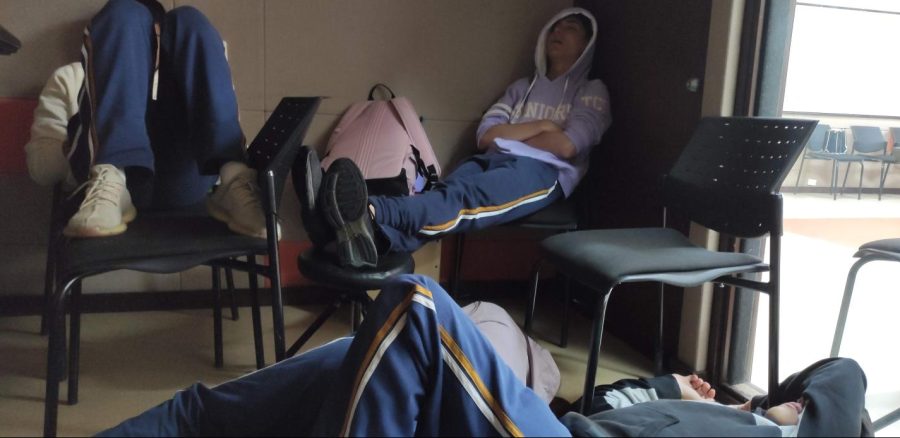Students Battle to Stay Awake in Class
12th graders sleep during band class.
A cold morning breeze penetrates a window gap, the teacher looks at her computer while some students work, or in their cell phones. A student drops his bag on top of the desk, leans over with a hoodie on, and places his head on the desk. His eyes are tired and baggy, he closes them… It seems like he didn’t have enough rest last night…
Students use their time in class for compensating sleep time due to late hours of going to bed.
Sleep deprivation among students has grown into a significant problem in High School as they have been reported to stay up playing video games or watching TV until 12 to 2 AM during weekdays. They start the day with sleep cravings and decide to use the time in class to sleep with their head on the desk.
“Generally I sleep about 5 to 6 hours, I think is not enough, so I top it up with some sleep in class,” Senior Sebastián Vélez said.
Feeling tired comes from insufficient sleep and rest. On average a healthy schedule for teenagers is to sleep eight to nine hours. The melatonin created during this time helps complete the growing process of the person.
According to The American Academy of Sleep Medicine, children aged 6 to 12 years should regularly sleep 9 to 12 hours, and teenagers aged 13 to 18 years should sleep 8 to 10 hours.
If students go to bed at 11 or 12pm and wake up around 6:30 the next day, it is not enough sleep to have maximum proactivity the next day.
It is normal for university students to stay up working on a project for long hours and skip sleep to complete it. But it is not the case for TCS students, who have less work to complete at home.
“If students stayed late because they have lots of homework it’s understandable, but this school has little homework. They are staying late because they are either playing video games or watching TV,” 11th-grade Philosophy Teacher Carlos Ledezma said.
Sleeping head-on-desk is not an inconvenience for students, but it gets to the point where some find it comfortable.
“I am always tired, sometimes I get bored with the class topics, or I sleep in the first blocks because the fact of getting up early every day makes me really lazy and tired,” Vélez said.
Some teachers find sleeping in class disrespectful. For others, if a student sleeps it’s not something personal, because the teacher gives the course and the student decides to pay attention.
“I never take it personally when a student sleeps during my class. I think the student lacks habits and time management,” Ledezma said.
Teachers who don’t approve of sleeping in class would take the affair to the office. This specific case is not a found in the TCS manual de convivencia, although it is suggested that families take part in the time management of their children. According to the manual de convivencia, in the rights and duties of the TCS families, parents should promote their children’s norms of urbanity and good habits.
“The main cause of the students staying late at home is video games. Sometimes I ask students why are they tired, their video games sessions can last up until two or three in the morning. Parents have no control at all in these cases, and the lack of sleep in students is visible by how they act and look,” Ledezma said.
Students get behind in their work. They arrive at class and use the time for sleeping and restoring the rest not obtained at night. This makes them miss the class explanations and feel lost when they wake up.
“When I sleep in class I have to ask for the explanation again at the end of class or see if there is something in Schoology,” Senior Luciana Alzate said.
A loop is created by students caused by falling behind in class and having homework. Students who have external activities and work left behind for not participating in class can also affect their sleeping hours. If this loop is repeated often, a habit is formed.
“Not only they will get behind, but the explanation of topics and concepts are also very important now that they will be then evaluated. So they will come to me trying to postpone an exam due date,” Ledezma said.
According to the Centers for Disease Control and Prevention, the best way to fix sleeping habits in a teenager is for parents to set a consistent sleep schedule during both weekdays and weekends, going to bed and waking up at the same time. Another solution is limiting light exposure from devices such as TVs, computers, and phones.
“I hear students often complain about exhaustion, and I’m worried they might be suffering from burnout. I worry about their sleep schedule,” Ledezma said.




